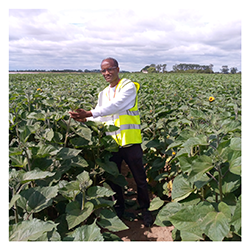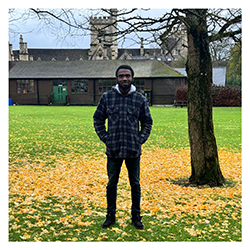SAFS African Research Grant Recipients

Meet the 2025 SAFS African Research Grant Recipients
Mesfin Zenebe
 This grant is made to support the data collection for the research project as part of my MSc dissertation. The research project entitled 'Assessing the adoption and effects of regenerative agricultural practices for the livelihoods of smallholder farmers in Ethiopia' aims at examining the extent of adoption of regenerative agricultural practices, the prevailing constraints of adoption and the extent to which adoption of the practices contribute to improvement of livelihoods in the context of small-scale farmers in Southern part of Ethiopia. For this purpose, Damot Gale and Sodo Zuria districts in Wolaita area of southern Ethiopia are the specific research location where the research collected the primary data with the support of the SAFS Africa Research Grant.
This grant is made to support the data collection for the research project as part of my MSc dissertation. The research project entitled 'Assessing the adoption and effects of regenerative agricultural practices for the livelihoods of smallholder farmers in Ethiopia' aims at examining the extent of adoption of regenerative agricultural practices, the prevailing constraints of adoption and the extent to which adoption of the practices contribute to improvement of livelihoods in the context of small-scale farmers in Southern part of Ethiopia. For this purpose, Damot Gale and Sodo Zuria districts in Wolaita area of southern Ethiopia are the specific research location where the research collected the primary data with the support of the SAFS Africa Research Grant.
The objective of the travel was to collect primary data from the research participant sample smallholder farmers in Ethiopia as part of the MSc dissertation for the course of Sustainable Agriculture and Food Security in Royal Agricultural University.
To facilitate the survey from the 286 sample population households, eight (8) data collectors were identified based on a clearly set criteria. For this purpose, criteria such as prior experience on rural livelihood related data collection, educational background on agriculture or rural development related, knowledge of the local population of the study area and good track record of good relationship with communities have been used for the recruitment of the data collectors. Based on the criteria set out above, eight data collectors who qualify the criteria have been selected out of a large pool of applicants.
The importance of financial support from the SAFS Africa Research grant was extremely huge. Had it not been this grant, my travel to the research location, recruitment of the data collectors and the collection of the primary data would not have totally been possible. The grant has been used to cover the cost of my plan travel to and from Ethiopia, per diem for data collectors and community facilitators, cost of food and accommodation for myself during the data collection period all of which would have been extremely difficult without the grant. I would like to extend my deep appreciation and thanks to Royal Agricultural University in general and those staff in the course of Sustainable Agriculture and Food Security in particular.
Seye Olufemi

My research is on the 'Climate shocks and resilience capacity impact on food security status in rural farming households in Ekiti State Nigeria'. The decision to travel to Ekiti State, Nigeria for data collection is a crucial aspect of this research study. Ekiti State, located in the southwestern region of Nigeria, is a hub for agricultural activities, making it an ideal location for studying rural households' food security challenges and coping strategies. The state's tropical climate, fertile soil, and abundant rainfall make it suitable for growing various crops, including cassava, maize, and yams.
The multistage sampling procedure adopted for the study requires me to visit selected Local Government Areas (LGAs) and villages in Ekiti State. This approach enables me to ensure that the sample is representative of the population, increasing the validity and reliability of the findings.
Moreover, traveling to Ekiti State allowed me gain first hand knowledge of the local context, including the environmental, social, and economic factors that affect rural households' food security. This contextual understanding is essential for interpreting the data and drawing meaningful conclusions. I was able to observe the living conditions, farming practices, and coping strategies employed by rural households, providing a richer understanding of the complex issues surrounding food security. The data collected from Ekiti State provided valuable insights into the food security challenges facing rural households in the region.
The study's findings have significant implications for policy and practice, and contributed to the development of effective solutions to address food security challenges in the region. Furthermore, the study's findings contributed to the achievement of the Sustainable Development Goals (SDGs), particularly SDG 2 (Zero Hunger) and SDG 13 (Climate Action). The study's focus on food security and coping strategies provided valuable insights into the impact of climate change on rural households' food security, and inform policy decisions aimed at promoting sustainable agriculture and enhancing the resilience of rural households to climatic shocks.
Rufayi Abdulai

My research proposal entitled 'Evaluating the Impact of Organic and Inorganic Fertilizers on Soil Carbon Sequestration and Soil Health in the Guinea Savanna of Ghana' seeks to assess how different fertilizer types influence soil quality and carbon storage potential in a key agricultural region of Ghana. With growing concerns about land degradation and climate change, this study aims to compare the effects of organic and inorganic fertilizers on key soil health indicators, such as organic matter content, microbial activity, nutrient balance, and carbon sequestration.
By conducting field experiments and collecting soil data from the Savanna Agricultural Research Institute (SARI), the research will generate insights that can inform sustainable soil fertility management practices in the Guinea Savanna.
Ultimately, the study is intended to support policy and farmer-level decisions that promote climate-resilient agriculture and long-term soil productivity.